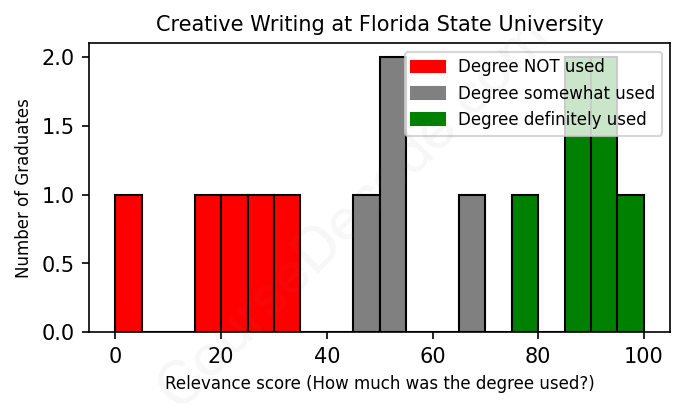
First, some facts. Of the Creative Writing graduates from Florida State University we've analyzed , here's how many have used (or NOT used) their degree in their career:

These are estimates based on AI analysis of 15 LinkedIn profiles (see below).
The verdict? Significantly below average. Overall, with an average relevance score of 56%, Creative Writing graduates from Florida State University have a much lower likelihood (-11%) of finding work in this field compared to the average graduate across all fields:
And for comparison, here's the chart for all profiles we've looked at across all degrees.
Also, after graduating, 53% of these graduates have pursued further education other than another Bachelor's degree (such as a Masters degree or other), compared to the average across all profiles of 35%. This suggests you may need more than just a Bachelors degree to be competitive as a Creative Writing graduate.
See the details:
|
Relevance score: 18% We think this person has NOT gone into a career related to their degree. We think this person has NOT gone into a career related to their degree.
DEGREE INFOGraduated in 2010 from Florida State University with a Bachelor of Arts (B.A.) in Creative Writing. No other secondary education since. JOB HISTORY SINCE GRADUATIONDirector of Private Events Estadio 2010 - 2010 Restaurant Manager  Estadio 2010 - 2013 Assistant General Manager  Doi Moi 2013 - May 2014 General Manager  Doi Moi May 2014 - Aug 2015 Restaurant Manager at The Flagler Steakhouse  The Breakers Palm Beach Sep 2015 - Jan 2018 Restaurant Manager at HMF  The Breakers Palm Beach Jan 2018 - Jun 2020 Restaurant Manager at Henrys Palm Beach  The Breakers Palm Beach Jun 2020 - Jan 2021 Vice President of Internal Operations  MCO Environmental Jan 2021 - Dec 2022 Staff Writer  The Infatuation Nov 2022 - Present ABOUTNo information provided. |
The top 10 most common jobs done by the graduates we've analyzed (ranked most common to least) are:
When looking at the career paths of graduates from the Creative Writing program at Florida State University, it's clear that many of them have landed jobs that vary significantly in terms of their relevance to writing. In fact, a large chunk of graduates have ventured into fields like restaurant management, general management, or customer service roles. These jobs—such as being a restaurant manager or working as a customer service representative—often emphasize operational or people skills rather than the creative writing prowess the graduates developed. It's pretty striking to see so many folks stepping away from writing-centric careers, especially considering the talent they cultivated during their study.
However, there are also some graduates making amazing strides in writing-related positions that truly reflect their degree's focus. Roles like Staff Writer, Editor, and even English Teacher highlight the applicability of their Creative Writing background, where their skills are not only welcomed but essential. While the overall trend shows that a good number of graduates have drifted into non-writing-related jobs, a solid segment has found their way into rewarding positions that leverage their creative talents. Overall, it’s a mixed bag—many stick to their craft, but a good number find themselves in unexpected fields that stretch away from Creative Writing.
Here is a visual representation of the most common words in job titles for Creative Writing graduates (this is across all Creative Writing graduates we've analyzed, not just those who went to Florida State University):

So, if you take a look at the career paths of folks who graduated with a Creative Writing degree from Florida State University, you’ll notice quite a mix! Right after graduation, many of them tend to land jobs that aren’t exactly glamorous or directly aligned with what they studied. For instance, early careers often include roles like restaurant management, customer service, or even some teaching positions. While some graduates managed to get into writing or editorial roles fairly quickly, others seemed to bounce around a bit before finding their footing in more writing-focused careers.
Fast forward five to ten years later, and you can see a different picture starting to emerge. Some graduates have carved out solid careers in writing, journalism, and education. For example, a number of them took on roles as instructors or managed to land editorial positions, indicating that they eventually found their way back to writing. Others took a more unconventional route, ending up in production roles within media companies or even starting their own ventures in film and writing. Still, there are those whose paths diverged significantly from the degree, leading them into fields that don’t directly utilize their creative writing skills. Overall, it looks like the trajectory can be pretty varied—while some graduates find success in writing or associated fields, many end up in jobs that, while stable, might not be what they envisioned when they started their Creative Writing journey. It just goes to show that while your degree can open doors, the path you take ultimately depends on a combination of your interests, opportunities, and a bit of luck!
Honestly, a Bachelor’s degree in Creative Writing can be pretty challenging, but it also kinda depends on your passion and dedication to writing. At Florida State University, or really anywhere, you’ll be diving deep into not just writing but also reading and analyzing tons of literature, improving your craft through workshops, and getting a lot of feedback on your work, which can be tough to take at times. Most students who love writing find it rewarding, but it definitely requires a lot of creativity, commitment, and self-discipline. So, if writing is your jam and you’re ready to put in the effort, you might find it more enjoyable than hard, but it won’t be a walk in the park!
Most commonly, in the LinkedIn profiles we've looked at, it takes people 4 years to finish a Bachelor degree in Creative Writing.
So, looking at the job histories of these Creative Writing grads from FSU, it seems like their paths vary quite a bit in terms of income. The first graduate, who's worked in a variety of restaurant management roles before moving into a Vice President position and then into a writing job, likely found some decent pay, especially in those managerial roles at a fancy resort. Others, though, like the one who freelanced, taught, and had a string of part-time gigs, might not have pulled in as much, especially starting out. Many seem to have settled into roles that either cater to their writing skills or involve teaching, which can be rewarding but might not pay a ton, especially early on. Overall, some have likely made a decent living, while others may still be figuring things out financially as they pursue their passions.
Here is a visual representation of the most common words seen in the "about" section of LinkedIn profiles who have a Bachelor degree in Creative Writing (this is across all Creative Writing graduates we've analyzed, not just those who went to Florida State University). This may or may not be useful:

Here are all colleges offering a Bachelor degree in Creative Writing (ordered by the average relevance score of their Creative Writing graduates, best to worst) where we have analyzed at least 10 of their graduates:
| College | Score | Count |
|---|---|---|
 University of Central Florida University of Central Florida
|
58 | 17 |
 Florida State University Florida State University
|
56 | 15 |
 Columbia College Chicago Columbia College Chicago
|
54 | 10 |
 University of Washington University of Washington
|
53 | 11 |
 University of California, Riverside University of California, Riverside
|
45 | 10 |
 Southern New Hampshire University Southern New Hampshire University
|
44 | 26 |
 Western Washington University Western Washington University
|
44 | 10 |
 Full Sail University Full Sail University
|
21 | 31 |